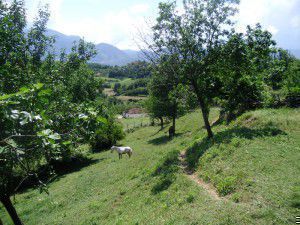Don’t be shy, get talking!
A recent poll has found that only one in ten British travellers learn any of the language before they visit another country. Some claimed this was because English is now so widely spoken, while others blamed shyness and a fear of saying the wrong thing.
I understand the second excuse much more than the first. Just because we can get away with speaking English doesn’t mean we should. Learning just a few words can make a huge difference, not only to those you’re speaking to but to your own holiday experience. And you don’t have to learn anything complicated. Five per cent of people surveyed said they just learnt the absolute basics, like hello, please, thank you, water and beer. Sometimes all it takes is a friendly greeting in someone’s native language, and they see you in a whole new way – as someone who respects their culture and has made an effort, however small. And that will come across in the way they treat you, making your time in the country a lot more fun. Not only that but you’ll feel pretty good about yourself – I remember several years ago on a school trip to Spain, a friend of mine ordered an ice cream in Spanish. An ice cream – it was as simple as that. But she was so proud of herself when the vendor understood her and she completed the purchase in a language not her own.

Benny Lewis, who’s known as the Irish polyglot, has spent nine years travelling in different countries, learning languages as he goes. Every few months he announces a new challenge, learns some vocabulary and then – he just goes to the country and starts talking. He doesn’t worry about making mistakes or getting his grammar slightly wrong.
Obviously we’re not all as brave as Benny. I’m certainly not. But there does come a point when you have to stop being scared and just take a risk. People are not going to point and laugh if you don’t pronounce something quite right. As a general rule they’ll be so pleased to hear you trying to speak their language that they won’t mind at all, and will probably go out of their way to help you get it right next time.
So let’s be brave! Next time you go on holiday try learning a few basics before you go, and see what a difference it makes…
Liz
A Goulash guy in foggy London
If you ever go to Hungary, and you happen to ask someone about a  restaurant where exceptional goulash soup is served, don’t be surprised if 8.5 people out of 10 reply, “I don’t speak English” (even if they do). The reason is not related to our average IQ, which is fortunately relatively high, but it’s based on our Eastern European bringing-up.
restaurant where exceptional goulash soup is served, don’t be surprised if 8.5 people out of 10 reply, “I don’t speak English” (even if they do). The reason is not related to our average IQ, which is fortunately relatively high, but it’s based on our Eastern European bringing-up.
In Hungary people are very shy and inhibited thanks to 40 years of strict Communist breeding. We have been taught to keep quiet and we are very good at this. Even today, a couple of generations later, it’s still coded in our genes and it is a difficult task to laugh and enjoy something without asking permission before doing it.
In our schools the expectations are very high. If you cannot pronounce the “th” sound perfectly by pinching your tongue with your teeth, you fail and go to jail.
No, just kidding, but it’s still not easy to pass English exams.
Teachers compliment-wise are very stingy. They usually don’t say anything laudatory, as it would be harmful pedagogically (based on Russian scientific researches from the 70s, which we have to take really seriously).
If you want to have a certificate in English in Hungary, prepare for the worst – you have to talk about the blue jay’s ritual dancing habits or paraphrase the rules of Malay football in English, subjects that you’ve never heard of in your life and probably you couldn’t say a word about even in Hungarian.
For this reason when a typical Hungarian goes to a different country, it is a challenge to her/him to start speaking confidently in the language of the country she/he visits. We always can see the little guy in the black jump-suit with the pitchfork on our left shoulder, saying, “Don’t even think about saying anything, your pronounciation is horrible, you might even hurt someone.”
Don’t be afraid, the little guy is wrong, take courage and speak!
Zsolt
You look the same – you talk the same?
There is a never-ending stream of book-to-film adaptations. Those that quickly come to mind include The Shawshank Redemption, the Harry Potter series and the Twilight series.
One film that struck a chord is the 2005 film Memoirs of a Geisha. Based on the book of the same name by Arthur Golden, it depicts the tale of a young girl who grows up to be one of the most prominent geisha in Kyoto.
As a big fan of the book, I was curious as to how it was going to be made. However, I ended up being disappointed. I was confronted by a feature with three distinguished Chinese actresses in the lead roles, speaking English. The only Japanese native speakers had secondary roles, yet they were also speaking English.
From the initial news on its production, I envisioned the film to be a celebration of Japan – from its language to its culture. There was an opportunity to use undiscovered talent speaking Japanese, taking pride in a film about one of the most culturally significant aspects of their country.
The use of English may have increased the appeal and accessibility of the film but the fact that they used Chinese actresses to represent Japanese characters with English dialogue lacks originality. It is like a McDonalds film – it appeals to the masses with very little taste.
For this reason, I enjoyed Lost in Translation. You learn about different aspects of Japan – the culture, the country, the people – and most importantly, Japanese actors speak Japanese. So what if you do get lost in translation? That’s all part of the fun 🙂
So everyone, how do you feel about films with clashing cultures? Do culturally relevant films need English? Thoughts on a postcard (or in the comments!) please…
Katie
Mysterious Albania
 Nestled in the heart of the Mediterranean with Greece, Macedonia, Kosovo and Montenegro as its neighbours, most people still don’t know much about this amazing country. Influenced by the Greeks, Romans, Italian and Turks, Albania does have a long and troubled history. But since communism ended in 1992 and the Republic of Albania was founded, it has remained more or less settled and it was chosen as the top country in the Lonely Planet list of ten top countries to visit for 2011.
Nestled in the heart of the Mediterranean with Greece, Macedonia, Kosovo and Montenegro as its neighbours, most people still don’t know much about this amazing country. Influenced by the Greeks, Romans, Italian and Turks, Albania does have a long and troubled history. But since communism ended in 1992 and the Republic of Albania was founded, it has remained more or less settled and it was chosen as the top country in the Lonely Planet list of ten top countries to visit for 2011.
To be honest, when I first met my Albanian husband Remzi, nearly five years ago, I did not know much about Albania myself – and I still meet people now who are not even sure where it is and think it is run by the Albanian Mafia! But I have now been fortunate enough to visit seven times, I’ve met all of Remzi’s family and friends and experienced the warm hospitality of the Albanian people and the beauty of the landscape. You also feel very safe; I remember on my first visit in September 2006, Albania were playing the Netherlands in a friendly football match in the capital Tirana and we happened to be walking past when the Dutch team’s coach got stuck on the turning into their hotel. The players decided to get out and walk – there were no police or security around and they just casually made their way to the hotel entrance. Cars on the main road did not even slow down; it was all very bizarre but typically Albanian – they do not like to make a fuss.
We have spent time in the mountainous North (where Remzi’s family are from) and the scenery is breathtaking, but I am yet to go to the beautiful and still unspoiled beaches in the South along the Ionian Coast, which is known as the Albanian Riviera. There are quite a few historic sites to see, like the ruins of Krujë Castle where General Skanderbeg fought off the Ottomans in the 15th century, and the many Byzantine churches and cobbled streets found at Berat Castle.
I have to admit I was quite slow off the mark in trying to learn the language, being a typical Brit and expecting everyone to speak English. The younger generation do but the majority of the population don’t, so it has been quite a struggle trying to communicate with most of Remzi’s family. But two years ago I started working at EuroTalk so had no excuse not to use the resources readily available to me! And it made a real difference on my last visit in June, which was just as well as we stayed with Remzi’s parents for most of the week. I have now decided to go to evening classes in the autumn where I hope to improve further and meet other people in the same situation as me with an Albanian partner. I find some words and phrases easy but just the basics like hello (‘tungjatjeta’) and goodbye (‘mirëupafshim’) are a bit tricky. So hopefully by my next trip I will have improved enough to have a proper conversation with my in-laws and get even more out of visiting such a wonderful country.
Do you have a partner from another country? How have you coped with learning their language?
Lotta
Liz’s Language Mission
Recently I set myself a mid-year resolution. I graduated in Hispanic Studies back in 2004, but haven’t really spoken Spanish since, and when recently a colleague needed me to talk to someone on the phone, I struggled to keep the conversation going. Thinking back to some of the experiences I had during my year living in Madrid (finding somewhere to live, doing exams, celebrating holidays with my non-English speaking landlady and her family), I can’t quite believe how much things have changed. So my mission is to get back to speaking Spanish regularly and (hopefully) fluently, with help from a variety of sources – movies, books, chatting to native speakers and anything else that occurs to me along the way. Hopefully at some point I’ll be able to fit in a visit to Spain where I can practise a bit more intensively, but until then I’ll have to make do with the resources at my disposal here in the UK, and will keep you updated with my progress! Once in a while I might post in Spanish just to show off 😉
If you have any suggestions or ideas to help me with my Spanish mission, please post a comment below. Thanks!
Liz
